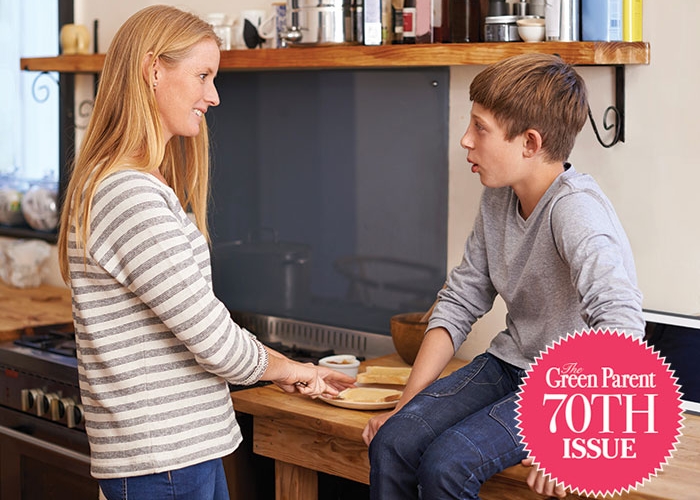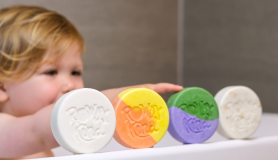This is one of the top twenty stories published in The Green Parent magazine from the last seventy issues. Want to read everything? This is just one of thousands of articles we’ve published. Read all our back issues online here – over 7,000 pages of content at your fingertips for £4.
I am taking lots of deep breaths. It’s supposed to calm the parasympathetic nervous system and I need a lot of calming. On the other end of the phone, my son, Jordan’s French teacher is describing the various and novel ways he has found to be rude to her.
‘He told me that I had just wasted the class’s time during the lesson.’
I apologise profusely. I tell her that ‘his dad and I will talk to him’. I think I even promise that we will punish him. I thank her for her patience.
When Jordan comes home, I sigh and say, ‘I am sick of getting emails and calls from your teachers. Don’t be rude.’
‘Can I just tell you my side of the story?’
‘I don’t care what your side of the story is, just stay out of trouble.’
‘This is only, like, the third time this year!’ he shouts. ‘What do you expect?’
‘I expect none,’ I counter. ‘You’re old enough to stay out of trouble.’
‘I’m not perfect, you know,’ he spits. ‘I’m sorry, but I’m just human. We can’t all be perfect like you.’
‘I’m not perfect,’ I say, scrounging for the ways in which I am very fallible.
‘Of course you are, name one way in which you’re not perfect.’ My hesitation infuriates him and he slams his bedroom door shut.
I fume around the kitchen because, the truth is, I am still vulnerable to embarrassment. Somewhere inside me I want other people to use words like ‘well-behaved’ and ‘polite’ when they refer to my kids. Why? Because people assume that your kids’ rudeness is, in some fundamental way, the direct result of your abject failure as a parent. It is the direct consequence of your inability to say ‘No’ or instil good values and good manners. Folks assume that if your child has no respect, you have not taught them to be respectful. I hate thinking about what that French teacher might be saying behind my back, and in French too.
“I start to wonder whether, in fact, i want a kid who just ‘does what he’s told’. What sort of a person would i be raising if he never spoke his mind?”
“I start to wonder whether, in fact, i want a kid who just ‘does what he’s told’. What sort of a person would i be raising if he never spoke his mind?”
Peeling the potatoes, I think of Keith, a man I knew in my twenties. Keith was a seriously-perfect gentleman. He arrived at my door on time, well dressed and recently showered. He paid for my dinner and had impeccable manners. In fact, I felt completely self-conscious about my table manners and found it hard to have a real conversation with him – he was so delightful, inoffensive and PC. I dated Keith. Once. My God, it would’ve been more fun spending the evening peeling potatoes.
Then I think to myself that Jordan is not boring. That it takes a certain ballsiness to tell a teacher, ‘You just wasted our time in this lesson.’
As I chop the carrots I imagine Jordan getting worked up and telling it like it is. I know how rude he can be. And that’s unacceptable. But there is something … brave about it. He’ll never be Keith.
I start to wonder whether, in fact, I want a kid who just ‘does what he’s told’. What sort of a person would I be raising if he never spoke his mind? If he just slunk into obedience whenever someone with authority threatened him? He’d end up like Keith. I have not sweated my ovaries out to raise Keiths.
Though it would be easier, less of a stretch for me, I don’t actually want my kids to adopt my view of the world without doing the hard work of figuring it out for themselves. Yes, I could ram my beliefs down their throats and force them to do things my way, but how would that help them become who they want to be? I bucked my parents’ systems. I rejected their ways. I dated non-Jewish guys when my dad was going through a particularly Orthodox stage. I brought shame on my family and apparently embarrassed my father in front of his friends. Why? Because I was living my life, not his. I want my kids to think their own way into the world.

As I rinse the lettuce leaves, I realise that compliance is not one of my values. I want my kids to have the backbone to confront authority, not to be intimidated; to speak up and to defend themselves. Being defiant is how they develop those personality muscles. And we are their laboratory. The more I ponder this and think of the pettiness and blatent bullying inherent in so many teachers with unresolved power issues, the more I soften. By the time dinner is ready I have done a complete 360 on the French teacher.
I knock on Jordan’s bedroom door.
I tell him that I think it’s brave of him to speak his mind when a teacher is frustrating. I offer that it’s a good idea to sometimes write down what you’re thinking before you say it and ask yourself whether saying it might get you in trouble. I tell him that I don’t mind if he gets in trouble, but that his life will be more miserable because he’ll have to stay for after-school detention and miss basketball. I suggest that sometimes it’s not what we say but how we say things that gets us into trouble. I also remind him that his ability to speak the truth is one of his greatest strengths, but that being strategic is an important life skill. Teachers who like us are on our side. Those who don’t are not. Surviving school is about making sure you have as many people on your side as possible. Some day, I tell him, it may be a police officer or a bouncer giving him a hard time, and the consequences of shooting your mouth off will be far more inconvenient than an after-school detention. He nods. I can see this makes a sort of sense to him.
‘See, I’m not perfect,’ I say. ‘I got cross with you and I was wrong and I’m sorry.’
‘I forgive you,’ he says, billowing a little.
‘That’s generous,’ I say. ‘And by the way, you still have to write an apology note to your French teacher.’
MORE INSPIRATION
READ Love in the Time of Contempt by Joanne for more consolations for parents of teenagers!
EXPLORE Postive parenting tips for teens at ahaparenting.com/ages-stages/teenagers
TREAT YOURSELF To a writing retreat in Tuscany in June with Joanne at joannefedler.com/retreats
Want to read more? Get your fix of awesome, thought-provoking articles delivered direct to your door here. The Green Parent is a bi-monthly print magazine, which costs just £8 for your first three issues. Find your tribe and get inspired!







